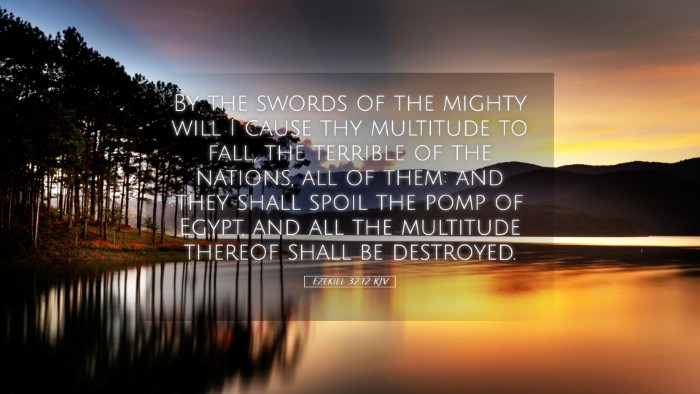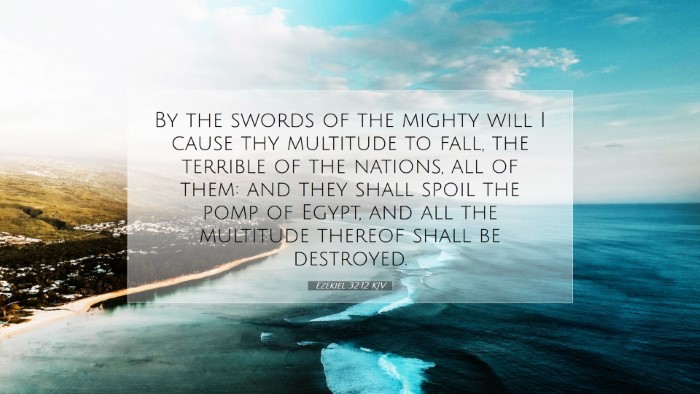Ezekiel 32:12 Commentary
Ezekiel 32:12 states, "I will cause thy multitude to fall by the swords of the mighty, the terrible of the nations;..."
This passage is part of a broader prophecy that speaks to the judgment coming upon Egypt and its allies. This commentary brings together insights from several public domain sources to elucidate the meaning and significance of this verse.
Contextual Background
The Book of Ezekiel is rich with prophetic messages that address the fate of nations. Ezekiel, a priest and prophet exiled in Babylon, conveys God's messages concerning Israel and the nations. This chapter specifically addresses Pharaoh and the land of Egypt, foretelling the destruction that will come upon them as judgment for their pride and idolatry.
Verse Analysis
The imagery of "swords of the mighty" indicates the power and ferocity of the forces that will execute God's judgment. This reflects the themes of divine retribution and the consequences of turning away from God. Let's examine the insights from various commentators.
Matthew Henry’s Commentary
Matthew Henry emphasizes that the prophecy holds a stark warning to Pharaoh and Egypt, symbolizing their impending ruin. He notes that their multitude, pride, and trust in military might will not save them.
Henry states:
"The powerful are here referred to as the executioners of God's judgment upon Egypt, showing that they are not outside of His sovereign control."
He brings to light the ironies of relying on human strength in the face of divine omnipotence.
Albert Barnes’ Notes
Albert Barnes provides insight into the "terrible of the nations," elucidating that these represent the mightiest armies that God will use to achieve His purposes.
He interprets the "sword" as a metaphor for warfare and discusses how this judgment serves to fulfill God's overarching plan for history.
Barnes observes:
"This verse signifies the totality of devastation; not only will there be loss of life, but the very identity and essence of Egypt will be destroyed."
Adam Clarke’s Commentary
Adam Clarke offers a textual analysis of "fall by the swords." He argues this reflects not just physical death but spiritual desolation.
Clarke points to the social and cultural consequences of such a defeat, suggesting it diminishes the national pride and religious idolatry of Egypt.
Clarke writes:
"What is indicated here is not merely a military defeat but an annihilation of the very spirit that made Egypt a power among nations."
Theological Implications
The verse underscores a significant theological theme: the sovereignty of God over all nations. The destruction of Egypt serves as a reminder that no nation can stand against God's will.
Key thoughts include:
- Divine Justice: God enacts justice against nations that persist in sin and idolatry.
- The Futility of Pride: Humanity's arrogance in military might is but a facade against divine wrath.
- Universal Relevance: While directed at Egypt, the implications are universal, applicable to all nations in their relationship with God.
Application for Today
For pastors, students, theologians, and scholars, this verse serves as a powerful reminder of the dangers of spiritual complacency. Just as Egypt relied on its own strength, contemporary societies may do the same, neglecting the sovereignty and authority of God in their affairs.
Practical applications include:
- Reflection on National Identity: The passage invites reflection on how nations today need to seek genuine repentance and reliance upon God.
- Guidance for Ministry: Pastors are encouraged to emphasize the attributes of God, warning against the pride that might lead to downfall.
- Engagement with Culture: Bible scholars should explore how this historical prophecy shapes our understanding of contemporary cultural dynamics.


